Tamilnadu Schemes for TNPSC Exams
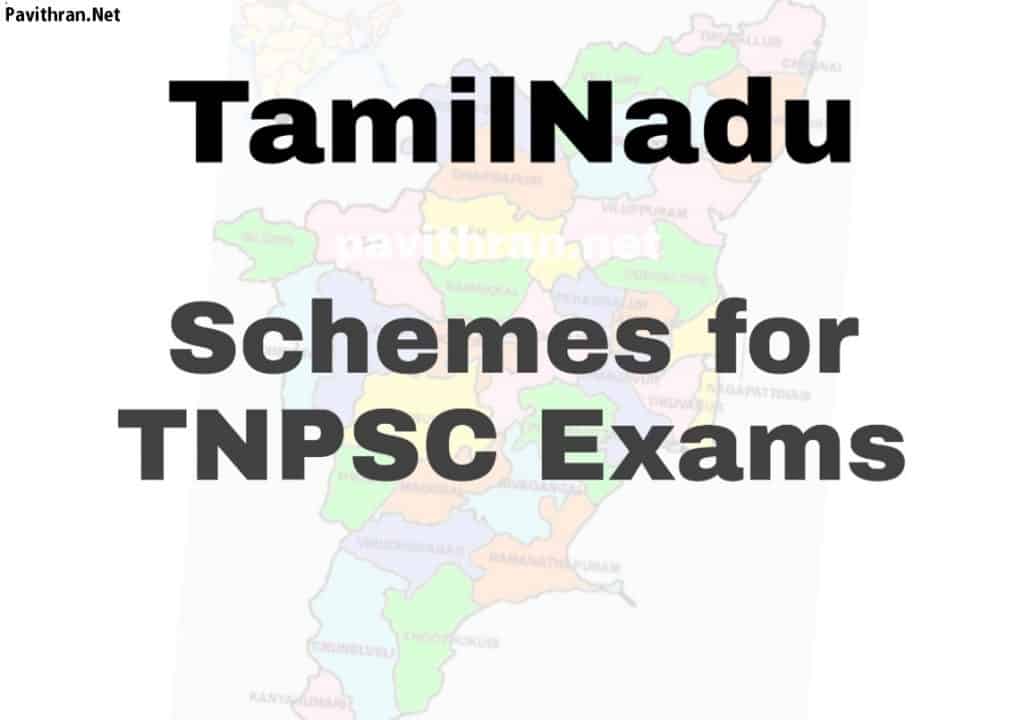
J.J in Day 1 in 2016
- Prohibition in a phased manner
- 100 units of free power in two – month bill cycle
- Orders free 200 units of power to handloom weavers.
- Free breakfast scheme for government school students
- waiver of crop loans for farmers (5780 crores)
- 8 grams of gold to women for “thali”
Kudi Maramathu Scheme
- Aims to restore the water bodies of Tamil Nadu such as dams, lakes and reservoirs with the help of local farmers
- Government Order on 4th July 2018
- regarding the appointment of 7 IAS Officers as monitoring officers of the scheme
- Launched on 13 March 2017 by Chief Minister Edappadi K. Palaniswami at
- Manimangalam village in Kancheepuram district
- It included maintenance works in supply channels, canals, tanks, shutters, strengthening and reconstruction of surplus weirs and sluices.
- It has been allocated an amount of 100 crores in its first phase.
- As per the scheme, the beneficiaries or the farmers have to contribute 10 percent of the allocation.
- This contribution can be in the form of cash, labour or material.
- The scheme has also received financial assistance from the World Bank.
- It aims to remove weeds from water bodies and strengthen their water-banks.
Nutritious Meal Programme
- Mid-Day Meal Scheme
- Popularly called as Puratchi Thalaivar MGR Meal Programme
- Launched in Primary Schools for classes I-V during 1st July 1982 and to Pre-school Children of 2-5 years in Rural areas.
- Extended to Nutritious Meal Centres in urban areas from 15-9- 1982
- Further extended to school students in the age group of 10 to 15 from September 1984.
- The students in 1 to V Standard do receive nutritious meal throughout the year (except holidays)
- Those in the VI to X Standard receive the meal in all the school working days (220 days).
Objectives:
- Achieving universal primary education, motivation for further education, increasing enrolment, retention & reducing dropouts.
- To make available nutritious food to children enrolled in schools thereby reducing child mortality, morbidity & malnutrition.
- To develop the grasping power of children by improving the nutrition level.
- Combating all diseases including those resulting due to deficiencies.
- Reduce the gender gap in education.
- To develop the feelings of brotherhood and to develop a positive outlook through combined fooding for the children belonging to different religions and castes.
Day and Menu:
- Monday – White Rice, Vegetable Sambar with one boiled egg (one banana for those who do not eat egg)
- Tuesday – White Rice, Vegetable Sambar with one boiled egg (one banana for those who do not eat egg) and 20 gms of a boiled green gram or Bengal gram (alternatively)
- Wednesday – White Rice, Vegetable Sambar with one boiled egg (one banana for those who do not eat egg)
- Thursday – White Rice, Vegetable Sambar with one boiled egg (one banana for those who do not eat egg)
- Friday – White Rice, Vegetable Sambar with one boiled egg (one banana for those who do not eat egg) and 20 gms of boiled potato
Recent schemes under New CM
- Funds for Pregnant women from 12k to 18k
- Amma Two Wheeler scheme
- Neera Drink
- Kudi maramathu thittam
- 50% reservation for women in local bodies
- Focusing on women empowerment
- Tamil Nadu is the 17th state to legislate 50% representation for women in local bodies
Cradle Baby Scheme
- Launched in the year 1992 at Salem
- Later in 2001 Madurai, Theni, Dindigul and Dharmapuri
- In 2011 Cuddalore, Ariyalur, Perambulur, Villupuram and Thiruvannamalai
Objective:
- To eliminate the incidence of female infanticide and to create awareness among people regarding equality of gender.
- To provide social empowerment to girl children. Beneficiaries
- Deserted, abandoned & surrendered babies Eligibility
- Cradles are placed in reception centers, District social welfare board offices, District Collectorates, Hospitals, Primary Health Centers, Orphanages, and Children Homes to receive unwanted babies
- Surrendered/abandoned children are then placed in Government recognized institutions/centers for adoption by eligible couples
- The differently-abled children who are unable to be given in for adoption are handed over to specialized agencies for care and protection.
- NGO/citizens are encouraged to bring abandoned babies.
- The District social welfare officer and extension officers (Social welfare) are the officials for availing the information to beneficiaries and also organize camps, seminars, and conferences to create awareness about female infanticide.
- Cradle baby centers set up cost is Rs. 47.45 lakh and each center have a superintendent, an assistant nurse, an assistant, and other workers and adequate stock of milk powder, medicine, and clothes.
Benefits:
- Under Assistance to scheme for Girls Child, an amount of Rs.50,000 is deposited in the name of a girl child for a family with only one girl child and
- A sum of Rs.25,000 is deposited for a family with two girl children
- The fixed deposit will be renewed periodically once in five years.
- An annual incentive of Rs.1,800 is being given to the girl children on completion of the five years of deposit and it will continue up to the 20th year of deposit for her educational purpose.
- The maturity value is payable to girl child only if the child studies up to 10th Std and has appeared for the Public Examination.
- The fixed deposits under the scheme are maintained with the Tamil Nadu Power Finance and Infrastructure Development Corporation Limited, in a specially designed cumulative interest payment scheme.
Result:
- Child sex ratio which was 942/1000 in 2001 has risen to 943/1000 in 2011
- Sathiyavani Muthu Ammaiyar Ninaivu free supply of Sewing machine scheme
- Sewing Machines are supplied free of cost with a view to increasing the self-employment potential
- For rehabilitation of destitute women/widows, deserted wives, Differently Abled men and women, socially affected women and women from economically weaker sections.
- Destitute women/widows, deserted wives, differently-abled men and women, socially affected women and women from economically weaker sections.
- Not exceeding Rs.72,000 per annum
- 20 to 40 years
- Should have knowledge of tailoring
- Implemented by the Social Welfare and Nutritious Meal Programme Department.
- Since 24-02-2013
TN CM Girl Child Protection Scheme
- Earlier as Sivagami Ammaiyar Memorial girl child protection scheme
- Promoting the education of girl children,
- Eradicating female infanticide,
- Discouraging the preference for the male child,
- Promoting the small family norm,
- Promoting the welfare of girl children in poor families and to raise the status of girl children.
- Encourage girls to get married only after the age of 18 years.
- Encourage parents to adopt family planning norms with two girl children.
Eligibility criteria:
- The family only has one girl child and no male child in the family.
- In future no male child should be adopted.
- Age of the child should be less than 3 years at the time of enrollment in the scheme.
- Annual income of the family should not exceed Rs. 72,000/-
- Either of the parents should have undergone sterilization within 35 years of age.
- An amount of Rs. 50,000 is deposited in the name of the girl child born on or after 01/08/2011,
- In the form of fixed deposit with the Tamil Nadu Power Finance and Infrastructure Development Corporation Limited for a family with one girl child only.
- The copy of the fixed deposit receipt is given to the family of the girl child.
- An amount of Rs. 25,000 is deposited in the names of two girl children born on or after 01/08/2011
- In the form of fixed deposit with Tamil Nadu Power Finance and Infrastructure Development Corporation Limited,
- For a family with two girl children only.
- The copy of the fixed deposit receipt is given to the family of the girl children.
- The above deposit is renewed at the end of every 5 years
- On completion of 18 years of age the amount deposited along with interest will be given to the girl child.
- To get this benefit, the girl child should appear for 10th standard public examination.
- Thus, the matured amount will help the girl child to pursue her higher education.
- An annual incentive of Rs.1800 is given to the girl child every year from the 6th year of depo
- Annual income limit Rs.72000/-
- From the year 2013-14, Marriage Assistance Scheme have also been extended to the beneficiaries under the Girl Child Protection Scheme who were enrolled in the years from 1992 to 1995.
- Female literacy from 64.55% in 2001 to 73.44% in 2011 and
- Reduction in the dropout rate of girl children.
Useful Books for Competitive Exams
Best Books for Competitive Exams [PDF]
Disclaimer: Pavithran.Net doesn’t aim to promote or condone piracy in any way. We do not own any of these books. We neither create nor scan this Book. The Images, Books & other Contents are copyrighted to their respective owners. We are providing PDFs of Books that are already available on the Internet, Websites, and Social Media like Facebook, Telegram, Whatsapp, etc. We highly encourage visitors to Buy the Original content from their Official Sites. If any way it violates the law or if anybody has Copyright issues/ having discrepancies over this post, Please Take our Contact Us page to get in touch with us. We will reply as soon as we receive your Mails.
We Need Your Support. Please Share the Link if it is helpful to your Cherished circle

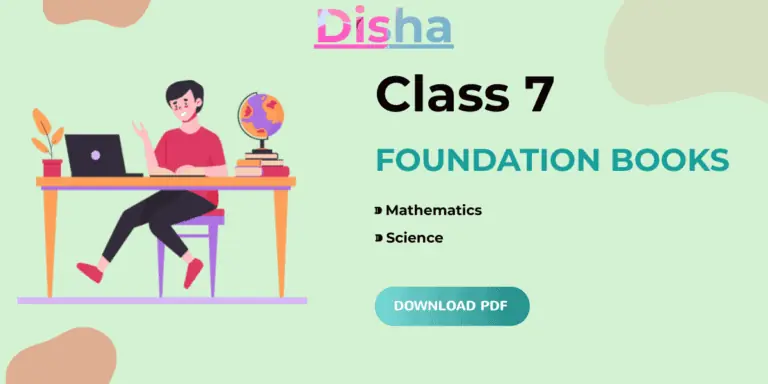
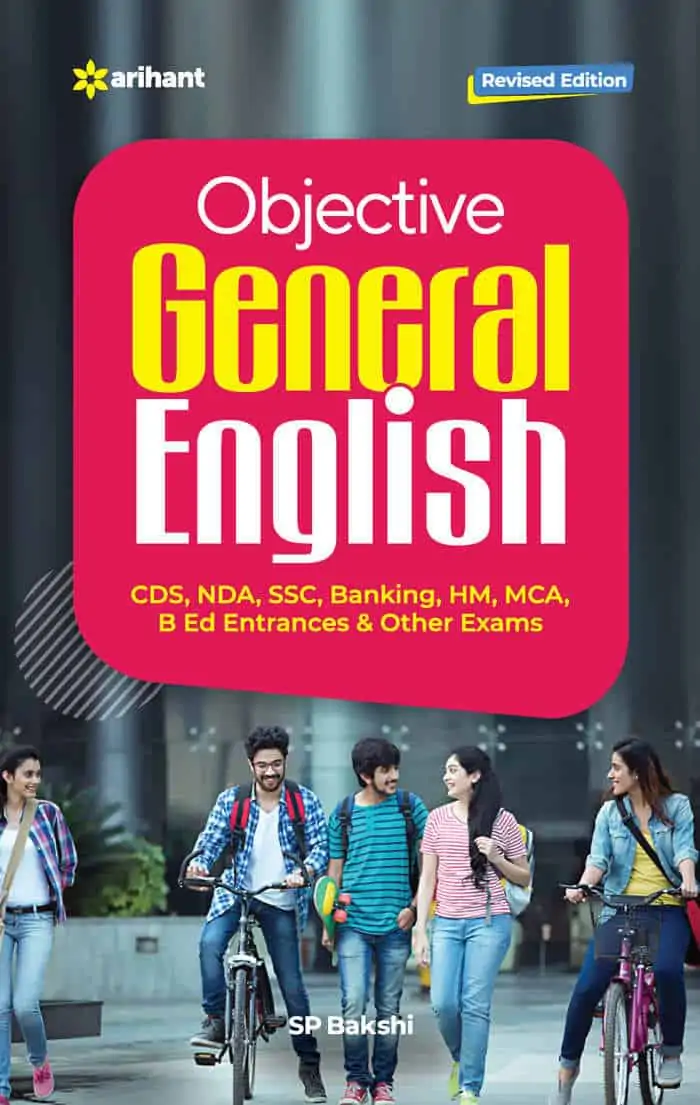
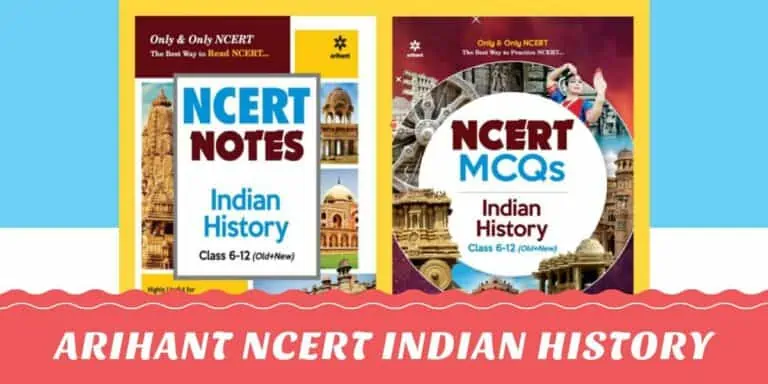
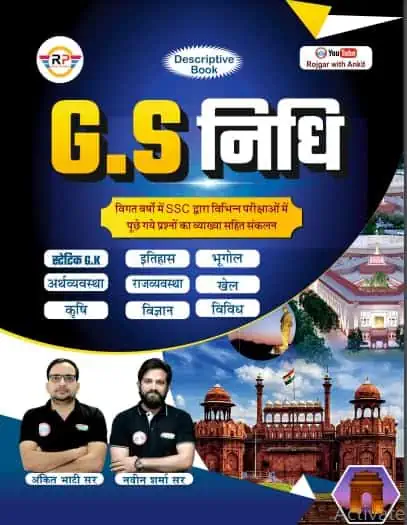
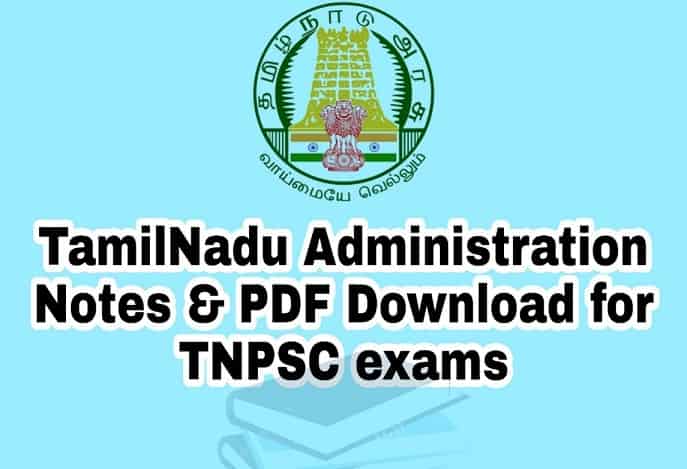
![Complete Guide for RRB Group D Level 1 Exam [4th Edition -2024] - Disha Experts](https://www.pavithran.net/wp-content/uploads/2025/03/Complete-Guide-for-RRB-Group-D-Level-1-Exam-4th-Edition-2024-Disha-Experts-785x1024.webp)